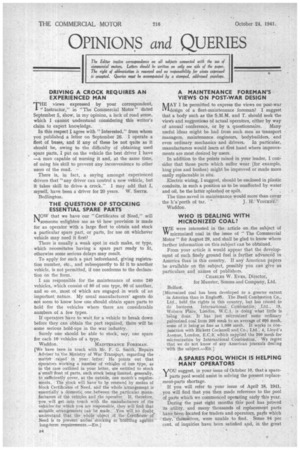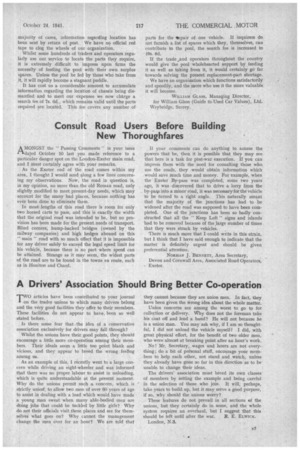OPINIONS and QUERIES
Page 22

Page 25

If you've noticed an error in this article please click here to report it so we can fix it.
DRIVING A CROCK REQUIRES AN EXPERIENCED MAN
THE views expressed by your correspondent, "Instructor," in "The Commercial Motor" dated September 5, show, in my opinion, a lack of road sense, which I cannot understand considering this writer's claim to expert knowledge.
In this respect I agree with "Interested," from whom you published a letter on September 26. I operate a fleet of buses, and if any of these be not quite as it should be, owing to the difficulty of obtaining used spare parts, I put on the vehicle the best driver I have —a man capable of nursing it and, at the same time, of using his skill to prevent any inconvenience to other users of the road.
There is, in fact, a saying amongst experienced drivers that "any driver can control a new vehicle, but it takes skill to drivea crock." I may add that I. myself, have been a driver for 20 years. W. SMITH.
Bed] in g-ton.
THE QUESTION OF STOCKING ESSENTIAL SPARE PARTS MOW that we have our "Certificates of Need," will I someone enlighten me as ta how provision is made for an operator with a large fleet to obtain and stock a particular spare part, or parts, for use on whichever vehicle may need it first?
There is usually a weak spot in each make, or type, which necessitates having a spare part ready to fit, otherwise some serious delays may result.
To apply for such a part beforehand, giving registration number, etc., and subsequently to fit it to another vehicle, is not permitted, if one conforms to the declaralion on the form.
I am responsible for the maintenance of some 240 vehicles, which consist of 80 of one type, 90 of another, and so on, most of which are engaged in work of an important nature. My usual manufacturers' agents do not seem to know how one should obtain spare parts to hold for the vehicles where there are considerable numbers of a few types.
If operators have to wait for a vehicle to break down before they can obtain the part required, there will be• some serious hold-ups in the war industry.
Surely one should be able to stock, say, one spare for each 10 vehicles of a type.
Waddon. MAINTENANCE FOREMAN.
[We have been in touch with Mr. F. G. Smith, Repairs Adviser to the Ministry of War Transport, regarding the -matter rai,s.ed in your. letter.. He points out that
operators working a number of vehicles of "one type, as in the case outlined in Your letter, are entitled to stock a small float of parts, such stock being limited, generally,
to sufficiently cover, at the outside, one month's requirements. 'The stock will have to be renewed by means of
block Certificates of Need, arid the whole arrangement is
essentially a domestic one between the ,particular lii-aneiaclurers of the vehicles and the operator._ if, therefore, you will get into touch with the manufacturers of the vehicles for which yon are reiponsible, they will find that suitable arrangements can be .made... .You will no doubt understand that the :whole .object of the teitifiCateNeed is to prevent undue stocking or lioaiding agairist. • long-term requirements.—En.] A MAINTENANCE FOREMAN'S VIEWS ON POST-WAR DESIGN I,JAY I be permitted to express the views on post-war Idesign of a fleet-maintenance foreman? I suggest that a body such as the S.M.M. and T. should seek the view's and suggestions of actual operators, either by way
of annual conference, or by a qaestionnaire. Many useful ideas might be had from such men as transport managers, maintenance engineers, bodybuilders, and even ordinary mechanics and drivers. In particular, manufacturers would learn at ifrst hand where improvements are most desired by users.
In addition to the points raised in your leader, I consider that those parts which suffer wear (for example, king pins and bushes) might be improved or made more easily replaceable in situ.
Electric wiring, I suggest, should be enclosed in plastic conduits, in such a position as to be unaffected by water and oil, be the latter splashed or spilt.
The time saved in maintenance would more than coyer the h'a'porth of tar. J. H. VINCE Waddon.
WHO IS DEALING WITH MICRONIZED COAL?
WEwere interested in the article on the subject of i nicronized coal in the issue of "The Commercial Motor" for August 29, and shall be glad to know where further information On this subject can be obtained.
From your article it would appear that the development of such. finely ground fuel is further advanced in America than in this country. If any American papers be available on the subject, possibly you can give us particulars. and names of publishers.
CHARLES W. EVES, Director, for Munster, Simms and Company, Ltd.
Belfast.
[Micronized coal has been developed to a greater extent
in America than in Englarilll. The Buell Combustion Co„ Ltd., held. the rights in this country, but has ceased to do business. International 1,Coiñbustion, Ltd., 19, Woburn Plate, London, W.C.1, is doing what little is being done. It has just -micronized sonite ordinary pulverized coal from 200 mesh to an average of 600 mesh, some of it being as fine as 1,000 mesh. It works in conjunction with Rickett Cockerell and Co.'; Ltd., 4, Lloyd's Avenue, London, E.C.3, which supplied the 200 mesh for micionization by International CombUstion; We regret that we do not know of any American journals dealing with the subject.—En.2
A SPARES POOL WHICH IS HELPING MANY OPERATORS VOU suggest, in your issue of October 10, that a spare' parts pool would assist in solving the present replace ment-parts shortage. • If you will refer to your issue of April 18, 1941, you will find that you then made reference to the pool of parts which we commenced operating early this year. During the past eight months this pool has proved its utility, and many thousands of replacement parts have been.located for traders and operators, parts which they,'"theinAelves, were unable to find. Some 94 per cent. of inquiries have been satisfied and, in the great majority of cases, inforthation regarding location has been sent by return of post.. We have no official red tape to clog the wheels of our organization.
Whilst some hundreds of traders and operators regulady use our service to locate the parts they require, it is extremely difficult to impress upon firms the necessity of feeding the pool with their own surplus spares. Unless the pool be fed by those who take from it, it will rapidly become a stagnant puddle.
It has cost us aconsiderable amount to accumulate information regarding the location of chassis being dis.: mantled and to meet our expenses we now charge a search fee of Is, 6d., which remains valid until the parts required are located. This fee covers any number of
parts for the Illepair of one Vehicle. If inquirers do not furnish a list of spares which they, themselves, can contribute to the pool, the search fee is increased to 10s. 6d.
If the trade,sand operators throughout the country would give the pool wholehearted support by .feeding it as well as taking from it, it would certainly go far towards solving the present replacement-part shortage.
We have an organization which functions satisfactorily and speedily, and the more who use it the more valuable it will become.
Wietame GLASS, Managing Director, for William Glass (Guide tb-Used Car Values), Ltd. Weybridge, Surrey_




















































